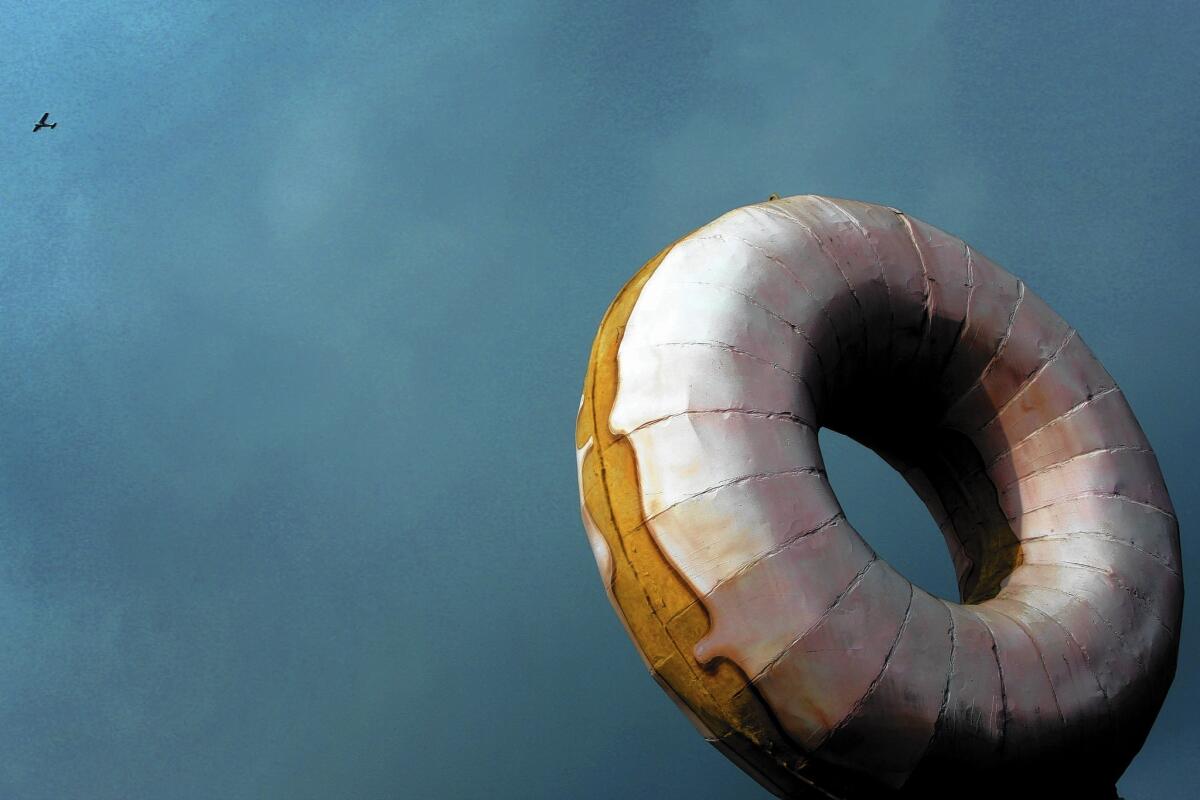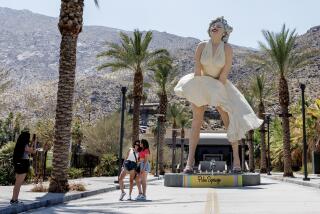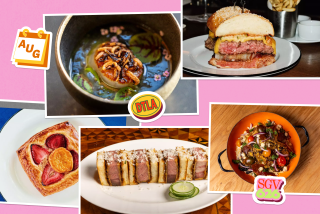Dunkin’ Donuts developer agrees to save Long Beach’s signature pastry

It’s hardly the holey grail of rooftop doughnuts. That honor would go to Randy’s Donuts just up the road in Inglewood. And it’s been more than a decade since doughnuts have even been made at this Long Beach cafe.
Still, for more than 50 years, residents have navigated the city’s grid with the pale-pink doughnut as their compass, a piece of oversized nostalgia sitting atop an eatery that was once part of a chain of storefronts named Mrs. Chapman’s Angel Food Donuts.
But with a Dunkin’ Donuts franchise getting ready to move in to the spot — and the company’s menu now leaning toward coffee, not doughnuts — there were plans to knock down the cafe and give the faded pastry to the city to store away.
That’s when the doughnut gang took up arms.
Worried it would be left to languish in a warehouse, never to be savored by Long Beach residents again, fans launched a save-the-doughnut Facebook page. A trucking company offered to move the oversized confection to a new location and a museum in the San Fernando Valley threw its hat in for the sugary ring.
Along the city’s “Retro Row” — chock full of vintage clothing shops and record stores — business owners began a spirited campaign to bring the sweet treat there.
Rumors flew that crews were already surreptitiously dismantling it, sending city inspectors scampering to the site to check on its well-being.
The L.A. Conservancy implored citizens to call City Hall and Dunkin’ Donuts’ East Coast headquarters to complain.
“This doughnut, as ridiculous as it may be, tells a lot about the development and growth of Southern California and Long Beach,” said Adrian Fine, director of advocacy for the Conservancy.
The sign is one of the few remaining Southern California examples of the big, campy signs that rose with the car culture, enticing passing motorists along thoroughfares, Fine said.
Not everyone understands the hoopla. Lisa Townsend once owned the cafe where the prized pastry stands, and even paid a premium to have it painted its now-signature frosty pink.
Even then, she said, patrons offered unsolicited opinions of her work. “Why did I paint it pink, why didn’t I use some other color — I couldn’t win,” Townsend said.
But she said she took pride in the refurbished sign, a symbol of her own childhood, and did her best to shoo away ever-present pigeons.
She added, however, that she can understand why Dunkin’ Donuts would want to box it up.
“I have $30,000 invested in that doughnut, and I don’t care if it stays or goes,” she said. (But she was careful to add that she thinks anything that well-loved should find a second life in the city.)
On Thursday, dozens of residents piled into City Hall, armed with historical factoids and ready to do battle.
The debate before the city’s planning commission stretched into the night.
The interior of the doughnut itself was said to be crumbling, and questions were raised as to whether it could even be moved.
“The integrity of the doughnut,” said a representative of the Dunkin’ Donuts developer, “is pretty suspect.”
History buffs demanded the structure be deemed a “historical resource,” and that an environmental impact review be completed to assess its value.
“The doughnut is more than just a silly sign,” said Shannon Carmack, a member of the city’s Cultural Heritage Commission. “It represents some of the things I love about this city — it’s big, it’s quirky and it’s beautiful.... I love that eccentricity and I want to keep it.”
To the surprise of some, the doughnut kings relented.
“We want to be good neighbors,” said Dan Almquist, a managing partner of Frontier Real Estate Investments, the Dunkin’ Donuts franchisee behind the proposal. “The last thing we want to do is be viewed as the guys that killed the doughnut.”
With that, city leaders pledged to make sure the doughnut stays on site. The planning commission will take up the matter again in March, once the development plan for the site is fully baked.
And Retro Row business leaders, for the moment satisfied, are no longer calling for the doughnut’s removal to Fourth Street. That includes Kerstin Kansteiner, owner of Portfolio Coffeehouse and ringleader of the save-the-doughnut campaign.
“It’s always been about saving the doughnut,” she said, “not stealing the doughnut.”
More to Read
Sign up for Essential California
The most important California stories and recommendations in your inbox every morning.
You may occasionally receive promotional content from the Los Angeles Times.











